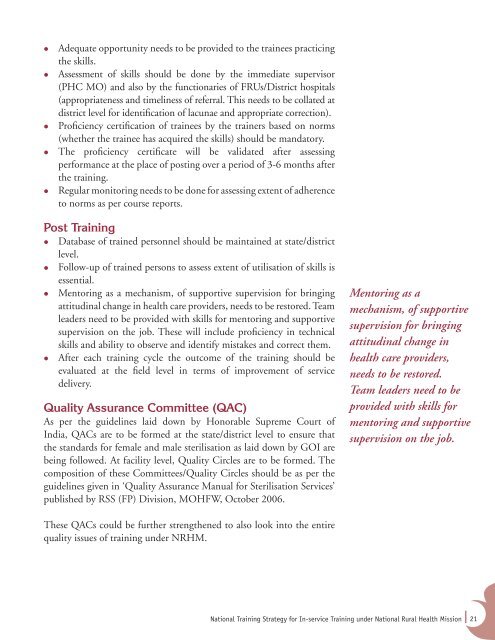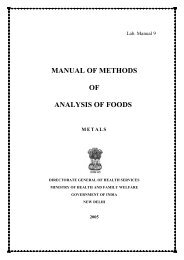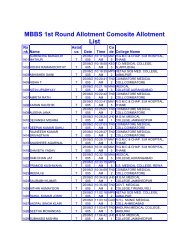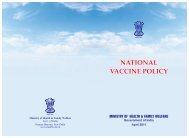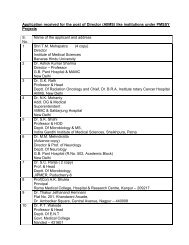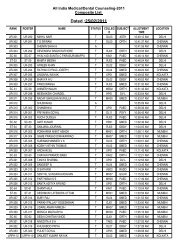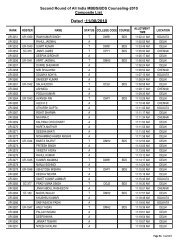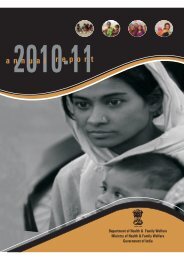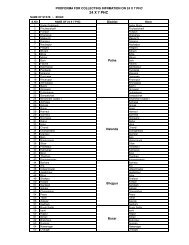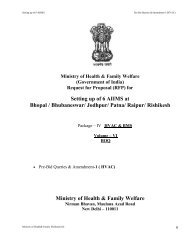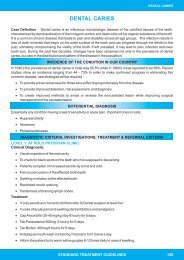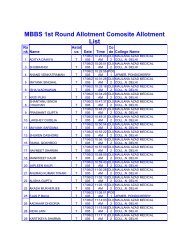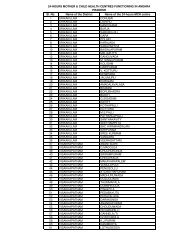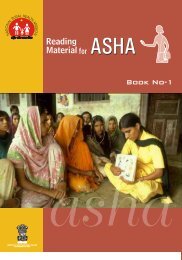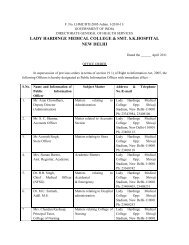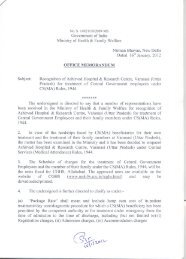National training strategy - Ministry of Health and Family Welfare
National training strategy - Ministry of Health and Family Welfare
National training strategy - Ministry of Health and Family Welfare
Create successful ePaper yourself
Turn your PDF publications into a flip-book with our unique Google optimized e-Paper software.
� Adequate opportunity needs to be provided to the trainees practicing<br />
the skills.<br />
� Assessment <strong>of</strong> skills should be done by the immediate supervisor<br />
(PHC MO) <strong>and</strong> also by the functionaries <strong>of</strong> FRUs/District hospitals<br />
(appropriateness <strong>and</strong> timeliness <strong>of</strong> referral. This needs to be collated at<br />
district level for identification <strong>of</strong> lacunae <strong>and</strong> appropriate correction).<br />
� Pr<strong>of</strong>iciency certification <strong>of</strong> trainees by the trainers based on norms<br />
(whether the trainee has acquired the skills) should be m<strong>and</strong>atory.<br />
� The pr<strong>of</strong>iciency certificate will be validated after assessing<br />
performance at the place <strong>of</strong> posting over a period <strong>of</strong> 3-6 months after<br />
the <strong>training</strong>.<br />
� Regular monitoring needs to be done for assessing extent <strong>of</strong> adherence<br />
to norms as per course reports.<br />
Post Training<br />
� Database <strong>of</strong> trained personnel should be maintained at state/district<br />
level.<br />
� Follow-up <strong>of</strong> trained persons to assess extent <strong>of</strong> utilisation <strong>of</strong> skills is<br />
essential.<br />
� Mentoring as a mechanism, <strong>of</strong> supportive supervision for bringing<br />
attitudinal change in health care providers, needs to be restored. Team<br />
leaders need to be provided with skills for mentoring <strong>and</strong> supportive<br />
supervision on the job. These will include pr<strong>of</strong>iciency in technical<br />
skills <strong>and</strong> ability to observe <strong>and</strong> identify mistakes <strong>and</strong> correct them.<br />
� After each <strong>training</strong> cycle the outcome <strong>of</strong> the <strong>training</strong> should be<br />
evaluated at the field level in terms <strong>of</strong> improvement <strong>of</strong> service<br />
delivery.<br />
Quality Assurance Committee (QAC)<br />
As per the guidelines laid down by Honorable Supreme Court <strong>of</strong><br />
India, QACs are to be formed at the state/district level to ensure that<br />
the st<strong>and</strong>ards for female <strong>and</strong> male sterilisation as laid down by GOI are<br />
being followed. At facility level, Quality Circles are to be formed. The<br />
composition <strong>of</strong> these Committees/Quality Circles should be as per the<br />
guidelines given in ‘Quality Assurance Manual for Sterilisation Services’<br />
published by RSS (FP) Division, MOHFW, October 2006.<br />
These QACs could be further strengthened to also look into the entire<br />
quality issues <strong>of</strong> <strong>training</strong> under NRHM.<br />
Mentoring as a<br />
mechanism, <strong>of</strong> supportive<br />
supervision for bringing<br />
attitudinal change in<br />
health care providers,<br />
needs to be restored.<br />
Team leaders need to be<br />
provided with skills for<br />
mentoring <strong>and</strong> supportive<br />
supervision on the job.<br />
<strong>National</strong> Training Strategy for In-service Training under <strong>National</strong> Rural <strong>Health</strong> Mission 21


